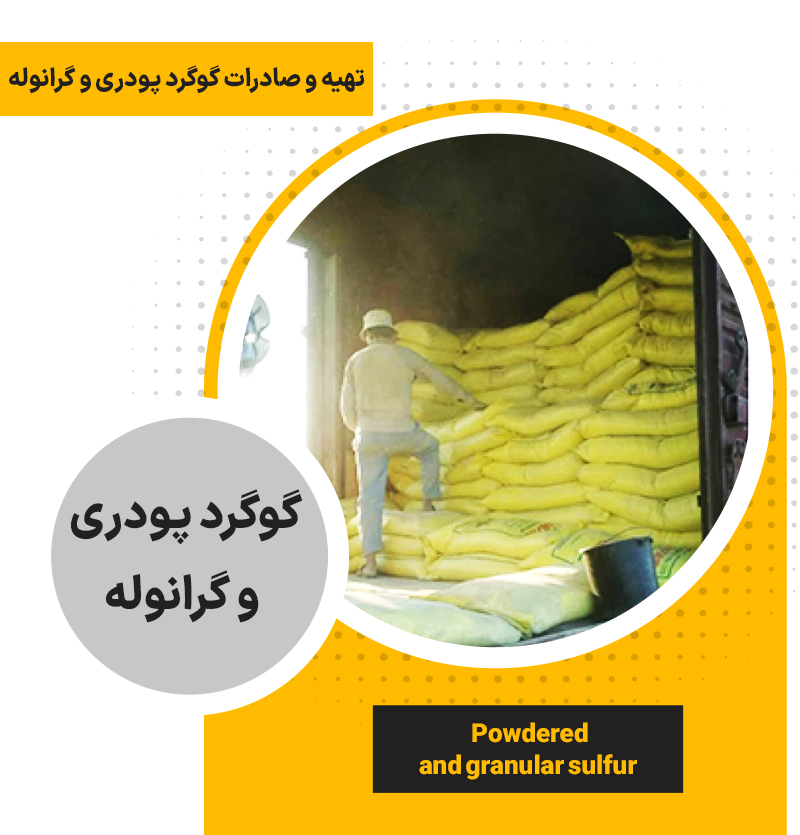Powdered and granular sulfur
Hits : 2770 |
barcode : 13
Powdered sulfur and special granule for agriculture
Powdered and granular sulfur
What is sulfur
Sulfur or sulfur with the chemical symbol S is the name of a chemical element that is in the sixth group (VIA) and the third period in the periodic table of the elements. This element is in the oxygen family. Prior to that, phosphorus, then chlorine, was placed on top of that oxygen and lowered selenium. Its chemical symbol is S and its atomic number is 16. The exploration of this element dates back to history.
Sulfur application is very diverse in various industries.
Sulfur Characteristics:
Sulfur is an odorless, odorless, and multivalent metal, most commonly known as yellow crystals in sulfide and sulfate minerals. Sulfur is an essential element for all living things. For example, the presence of sulfur in the structure of amino acids and proteins can be mentioned. This element is used primarily in fertilizers, but is also widely used in gunpowder, maltans, matches and insecticides. The sulfur element is naturally occurring in nature, pure sulfide or sulfate, along with other metal elements and amphibians. The cold and pure sulfur is yellow, but it is more colored due to high temperatures or impurities. According to the crystallization system, this type of sulfur as the sulfur-alpha (Rvmbyk or octahedral) sulfur beta (monoclinic or charter), sulfur-gamma (plastic) and amorphous sulfur (colloidal) is.
Sulfur in control soil acidity and lower the PH of the soil and improve soil alkaline and calcareous is effective because water can not be resolved and the process of oxidation of sulfur in the soil longer and therefore recommended that the bacteria Tello B. to accelerate the oxidation process is used.
Soil is considered as the main bedding plant, as well as a unique environment for life forms. Due to the beneficial effects of sulfur application in nature, the use of this product as a fertilizer and toxins to eliminate soil anomalies has a significant role.
Sulfur disinfects soil due to its fungal properties.
Sulfur of nitrogen, phosphorus, potash, fourth element widely used for plants is due to the beneficial effects Gvgvrd in removing mildew hair (grape) on the advice of experts use it to protect plants from removing cream White roots and insects are essential. Sulfur consumption reduces soil pH (PH), which makes plant access easy to maintain on soil.
Sulfur: It is found to be abundant in plants, especially in leaves. Sulfur is a component of protein in the plant, the most important activity of sulfur in the production of amino acids, followed by protein synthesis. This element is an important ingredient in the formation of essential vitamins for plant metabolism.
Sulfur is anion sulfate SO4-2 in soil solution.
Symptoms of sulfur deficiency in plants:
In plants, sulfur deficiency appears as pale and jaundice in young leaves and the plant's lateral parts. Sulfur deficiency has important effects on plant growth, the stems are thin and the leaves are wrapped up. In plants, sulfur deficiency causes the accumulation of non-protein nitrogen, and the use of these plants is harmful and harmful to ruminants. Sulfur deficiency also causes nitrate accumulation in plants that is toxic to animals for consumption.
Sulfur is an essential element for plant nutrition and its role is superior to phosphorus. The role of googled on plants, mainly making protein, oil and improving the quality of agricultural products. The amount of sulfur needed to harvest 12 tons of oily seeds per 8 kg for legumes and 4 kg for cereals. In mentioning the importance of sulfur in terms of plant nutrition, it is enough that in most agricultural products, the ratio of N to S (N / S) is necessary in the range of 10-15, and in oilseeds, this proportion to achieve increased yield and improve quality, Must be less than 10.
Attention:
Use of any kind of fertilizer in order to improve the soil and land of the gardens based on the soil test results, only with the opinion of experienced experts and engineers of the Jihad and Agriculture Organization of your area and trust them.
Refinery sulfur with a purity of 99.5%
Mineral sulfur with a purity of 25 to 40%
Sulfur yellow golden type refinery
Sulfur Yellow Canadian Petroleum Refinery
Sulfur husk, powdered and micronized
Sulfur consumption
Production of sulfuric acid, fertilizer production, rubber, gunpowder, match making, sugar and starch, insecticides and detergents, soaps, processing, dehydrating, disinfection of refrigerants, and other materials ...

